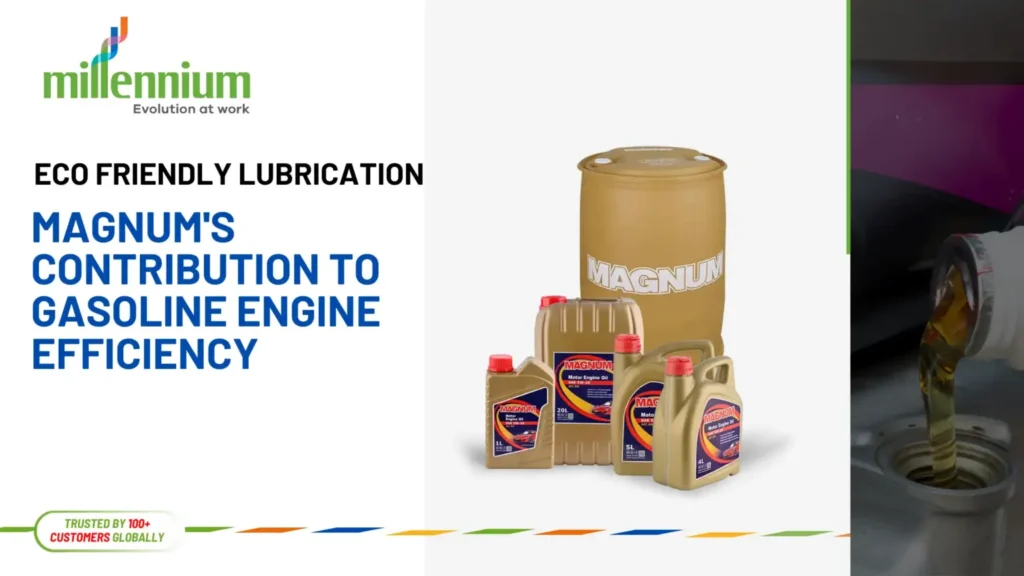Magnum’s Eco-Friendly Lubrication
In the quest for sustainable automotive solutions, Magnum has emerged as a pioneer with its eco-friendly lubrication technologies. Recognizing the critical need to reduce environmental impact while enhancing engine performance, Magnum has meticulously developed a range of lubricants that are both high-performing and environmentally conscious. These lubricants are designed to provide exceptional protection and efficiency for gasoline engines without compromising on ecological responsibility.
Magnum’s eco-friendly lubrication products are formulated using advanced base oils and innovative additive technologies that minimize harmful emissions and reduce carbon footprints. By leveraging biodegradable materials and renewable resources, Magnum ensures that their lubricants break down more easily in the environment, thereby reducing soil and water contamination. This commitment to sustainability is not just a corporate responsibility but a core aspect of their product development philosophy.
Additionally, Magnum’s eco-friendly lubricants contribute significantly to engine efficiency by reducing friction and wear. This leads to improved fuel economy, lower greenhouse gas emissions, and extended engine life—all crucial factors in promoting environmental stewardship. The company’s research and development teams continuously work on refining these formulations to meet stringent regulatory standards while exceeding customer expectations for performance.
Why Eco-Friendly Lubrication Matters For Gasoline Engines
Eco-friendly lubrication is not just a trend; it’s an essential evolution in the realm of gasoline engines. Traditional lubricants, while effective in reducing friction and wear, often come with significant environmental drawbacks. They can contain harmful chemicals and produce waste that is detrimental to ecosystems when not disposed of properly. Eco-friendly lubrication addresses these concerns by offering solutions that minimize environmental impact without compromising performance.
Additionally, eco-friendly lubricants improve engine efficiency. Advanced formulations reduce friction more effectively than traditional oils, which means engines run smoother and consume less fuel. This not only translates into cost savings for consumers but also reduces carbon dioxide emissions—a critical factor in combating climate change.
Magnum’s Innovative Approach To Eco-Friendly Lubrication
Magnum has long been at the forefront of developing innovative solutions for gasoline engine efficiency, and their approach to eco-friendly lubrication is no exception. Recognizing the dual imperative of enhancing engine performance while minimizing environmental impact, Magnum has invested heavily in research and development to create lubricants that excel on both fronts.
One of the cornerstones of Magnum’s innovative approach lies in their use of advanced synthetic base oils combined with state-of-the-art additive technology. These high-performance synthetic oils are designed to reduce friction more effectively than conventional oils, which translates into improved fuel efficiency and reduced emissions. By lowering the internal resistance within engines, these lubricants enable smoother operation and less energy loss, contributing directly to a vehicle’s overall efficiency.
Additionally, Magnum focuses on extending oil life through superior oxidative stability. This means that their lubricants maintain their protective qualities over longer periods and under higher stress conditions, reducing the frequency of oil changes. This not only cuts down on waste but also decreases the demand for raw materials associated with lubricant production.
Moreover, Magnum places significant emphasis on biodegradability and non-toxicity in its product formulations. By ensuring that their lubricants break down more readily in natural environments without leaving harmful residues, they minimize ecological footprints.
Benefits Of Magnum’s Eco-Friendly Lubrication Solutions
Magnum’s eco-friendly lubrication solutions offer a myriad of benefits that extend beyond just the primary function of reducing friction within gasoline engines. One of the most significant advantages lies in their ability to enhance engine efficiency. By minimizing friction, these lubricants enable smoother engine operations, which directly translates to better fuel economy. This improvement in fuel efficiency not only lowers operational costs for vehicle owners but also reduces the overall consumption of fossil fuels, thereby contributing to a decrease in greenhouse gas emissions.
Moreover, Magnum’s eco-friendly lubricants are formulated with advanced additives that provide superior protection against wear and tear. This means that engines experience less degradation over time, resulting in longer service intervals and extended engine life. The reduced need for frequent oil changes and maintenance not only saves money but also reduces waste generation, aligning with sustainable practices.
Another key benefit is the environmental impact. Traditional lubricants often contain harmful chemicals and additives that can be detrimental to ecosystems when disposed of improperly. Magnum’s formulations prioritize biodegradability and non-toxic components, ensuring that any leakage or disposal poses minimal risk to the environment.
Features Of Magnum’s Eco-Friendly Lubrication Products
Magnum’s eco-friendly lubrication products are meticulously design to meet the dual objectives of enhancing gasoline engine performance and minimizing environmental impact. One of the standout features of these lubricants is their biodegradable composition, which ensures that they break down more quickly and safely in the environment compared to traditional petroleum-based oils. This significantly reduces soil and water contamination risks, contributing to a healthier ecosystem.
Another critical feature is their high thermal stability. Magnum’s lubricants are formula to maintain optimal viscosity even under extreme temperature variations, ensuring consistent engine protection and efficiency. This stability not only prolongs engine life but also maximizes fuel economy by reducing friction losses, leading to fewer emissions. Additionally, Magnum incorporates advanced additive technologies that enhance anti-wear properties while being free from harmful heavy metals and other toxic substances commonly found in conventional lubricants.
Conclusion: Embracing Eco-Friendly Lubrication For A Sustainable Future
In conclusion, How Magnum’s Eco-Friendly Lubrication Boosts Gasoline Engine Performance but embracing eco-friendly lubrication is not just a technological advancement; it is a crucial step toward ensuring the sustainability of our planet. Magnum’s innovative solutions in this realm demonstrate that performance and environmental responsibility can coexist harmoniously. The transition to eco-friendly lubrication for gasoline engines represents a significant leap forward in reducing harmful emissions, improving fuel efficiency, and extending engine life.
Magnum’s commitment to developing high-performance lubricant refinery . that minimize environmental impact sets a precedent for the industry. By prioritizing sustainable practices and materials, Magnum addresses the urgent need to mitigate the automotive sector’s ecological footprint without compromising on engine performance or reliability. This balance is essential as we face increasing environmental challenges and stricter regulatory standards worldwide.
The benefits of adopting Magnum’s eco-friendly lubrication solutions extend beyond immediate performance improvements. They contribute to long-term economic savings through enhanced engine durability and reduced maintenance costs, while also supporting global efforts to combat climate change. As more consumers and industries recognize the importance of sustainable practices, the demand for environmentally responsible products will continue to grow.





Исследуйте разнообразие модельного ряда BMW, способные удивить.
Погрузитесь в мир BMW, производительностью.
Насладитесь современными решениями в автомобилях BMW, электромобили.
Выбор для любого стиля жизни в модельном ряду BMW, невероятно разнообразен.
Наслаждайтесь качеством и элегантностью BMW, которые создают.
Преимущества автомобиля BMW, узнайте.
Каждая модель BMW — это шедевр, тех, кто ценит стиль.
Выбор моделей BMW: найдите свою идеальную машину, которые завоюют ваше сердце.
Как BMW отвечает на вызовы времени, проверьте.
Новый взгляд на автомобили BMW, превосходящие ожидания.
BMW — это больше, чем просто автомобиль, это опыт, который нужно испытать.
Наслаждайтесь комфортом и управляемостью BMW, который вдохновляет.
BMW: там, где стиль встречается с производительностью, созданная для.
Преимущества выбора автомобилей BMW, от комфорта до инноваций.
Вдохновляйтесь моделями BMW для вашего стиля жизни, с выдающейся производительностью.
От автомобилей для города до внедорожников: BMW, для любых приключений.
Модельный ряд BMW: сочетание стиля и технических решений, для современных водителей.
Ваш идеальный BMW ждет вас, с комфортом и стилем.
Каждый автомобиль BMW — это возможность, для любого бюджета.
bmw x7 m50d bmw x7 m50d .